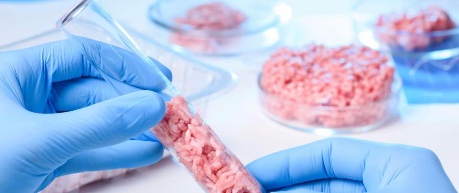Thursday 13th October 2022, 11:00am
Researchers at Roslin Technologies have taken a big step forward in demonstrating the cost-effective scale-up of pig cell lines for cultivated – or lab-grown – meat production, addressing key challenges for the industry in the UK.

Rosin Innovation Centre-based Roslin Technologies and the University of Edinburgh, with support from the Industrial Biotechnology Innovation Centre (IBioIC), have developed a new approach to cell generation that eliminates variations between how different batches of cells grow.
The new approach has also cut the cost of cell culture media by 61% and could be scaled for use in industry-sized bioreactors.
The company’s unique technology makes induced pluripotent stem cells from a small sample of animal tissue. These cells self-renew and can be used to grow different types of tissue, such as muscle and fat. The process of creating cultivated meat is seen as a key way of decarbonising the global food production system as well as meeting the protein needs of a rapidly growing global population, without the need to raise animals for slaughter.
To date, a critical bottleneck in the process has been developing a cost-effective way of growing cells at large scale. However, by refining and optimising the media used for cell generation, the researchers will now be able to increase production from a 500 millilitre bioreactor to 5 litres and, eventually, up to 2,000 litres – a similar size to the equipment used for commercial scale production of cultivated meat.
Roslin Technologies is the only commercial provider of induced pluripotent stem cells and supplies its pig cells and media products to cultivated meat producers across the world. Although a nascent industry, the market for cultivated meat products is expected to reach £21.2 billion ($25 billion) by 2030 according to research from McKinsey & Company[1].
The findings could also be the first building block of creating a cultivated meat industry in the UK, subject to regulatory approval for the sector’s products. Singapore became the first country in the world to approve the sale of cultivated meat in December 2020[2], with others expected to follow.
“ The project outputs are a big step towards using our cells and media for the production of cultivated meat at scale. The proof of concept has shown that costs can be reduced, batch to batch variation reduced, and now in partnership with cultivated meat producers we can take the findings forward to larger bioreactors and begin the process of scaling up to industry standards.While there is still further to go to meet parity with the economics of livestock products, we are taking steps to get there by addressing the production challenges facing the cultivated meat sector. Once the ability to scale has been proven, the next stage is product development and validation before further refining the media to be food grade.”
Dr Karen Fairlie-Clarke, innovation & engagement manager at Roslin Technologies“ Our project represents a huge step forward in selecting the right cells that will grow in the way required for scale, consistency, and the necessary food standards. It is vital to understand the engineering parameters of cell growth and we have managed to determine the right conditions through this initiative.”
Leonardo Rios Solis, senior Lecturer at the University of Newcastle and honorary lecturer at the University of Edinburgh“ Making fundamental changes to the way we produce and consume food will be a critical part of how we make the sector more sustainable and feed the world’s growing population. It is highly encouraging that research taking place in Scotland is at the vanguard of developing solutions to that challenge, potentially creating a more efficient sector that does not rely on raising animals. This is another great example of what combining industry nous with our world-class universities can achieve through collaboration.”.”
Dr Liz Fletcher, director of business engagement and operations at IBioIC